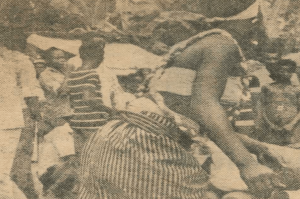
Amadi; the first Nigerian feature film in a local dialect, shows an artist who has managed to overcome the artist’s dilemma of satisfying audience who advocated that African films should reflect the aesthetic and intellectual pre-occupation of black people rather than imitate third-rate Western films. The plot of the film centres around Amadi (John Chukwu) who exchanges the city life in Lagos for the village life in the East-Central State. Seeking fulfillment in his native environment, he came into contact with old traditions and customs and rather than seek to change everything to suit his acquired modern outlook, he takes what he can and introduces new ideas to the villagers. The end result of the mutual exchange is the modernisation of agricultural methods in the village and the rebuild of the local Mbari Shrine dedicated to the earth goddess, Ala.
Amadi, which can be said to be the kind of sequel to Alpha (by the same producer,) like the former, but in a less elusive way, seeks progress. And unlike the poet in Alpha who bemoans, “J write books which don’t sell; people don’t want to read them or rather the people who rule them don’t want them to read”; Amadi is not only able to formulate ideas, he is able to influence and lead the villagers. But Amadi does not seek to lead in the way we are used to being led. He seeks ideas even from the villagers and particularly his friend Obi, (George Okoye) and he appreciates and sympathises with old traditions. Thus Amadi is the fulfillment of the unrealised hope in Alpha. The similarity does not end there. Amadi like Alpha demonstrates its creator’s ability to reach a mixed audience without necessarily being “cheap” or of poor quality. With the combination of easy dialogues, songs and dance the audience can derive aesthetically or symbolically from the two films.
Actors in Amadi included Obi (George Okoye), Amadi’s amputee friend with his magnetic stage presence; the unobtrusive twins: Ngozi and Ifeoma (Paulina and Angelina Atukpawu) who lend a romantic angle to the plot (who actually marries Ngozi). The villagers in real life, and though in a completely unfamiliar medium film, demonstrate great sense of art in movement and speech. Amadi, (John Chukwu) the focal point of the film who, with his natural look and good delivery of his speech and movements, carries the story effortlessly through the sequence of the film.
Amadi film and Nigeria of the decade
Amadi thrives on realism to the point of being painful. The juxtaposition of the slum and skyscrapers in the film is the most vivid demonstration of the pitiable condition of the nation’s unprogressive approach towards development. The film is a clear indictment against such lethargy. What is not so clear is the tag at the end of the film in which the Administrator of the East-Central State, Mr Ukpabi Asika, made an appearance at the village gathering of rapidly emancipated villagers. The administrator’s appearance, whatever its purpose, is superfluous and can even be interpreted as propagandist. The film, in reviewer Doyin Aboaba’s thinking, could do without this particular trimming and still retain its entity. A greater survival will, she said, depend on the distribution of the film to various audiences. To circumscribe the mafia chain of film distribution in Nigeria, the film maker needed more than self-perseverance. He needed the moral support of the government to get his films to his audience. It was clear at that time that only the government can break the foreign monopoly of film distribution in Nigeria. This was necessary so Nigeria did not remain the dumping grounds of the world film wastages.
Amadi, Kongi’s Harvest, Things Fall Apart, to mention a few notables of locally-produced films, were at the time Amadi premiered, a lone voice in the wilderness but they testified to the aesthetic qualities and capability of Nigerian local artists. Amadi was not a classic, but its ambition was a reminder of how smug and cheap some foreign films were, and how little they relate to the Nigerian experience[i].
[i] Daily Times, April 17, 1975





















